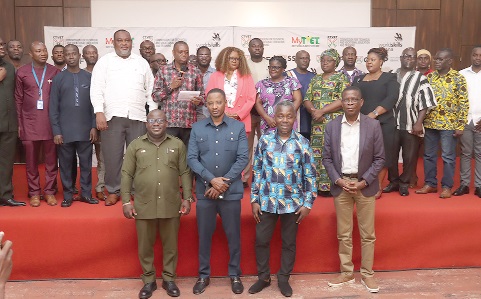Four advisory bodies have been set up to support the Commission for Technical and Vocational Education and Training (CTVET) in promoting technical and vocational education (TVET).
Known as Sector Skills Bodies (SSBs), the advisory bodies are made up of industry players, academics and policymakers, with the mandate to advise the CTVET on curriculum development, skills development, the job market, and overall policies to improve TVET education.
The four SSBs, which were inaugurated in Accra yesterday were telecommunications; environment, sanitation and waste management; media and entertainment; and electrical, automation and electronics.
So far, 16 SSBs have been inaugurated since 2019, with six more in the offing.
The four new SSBs were inaugurated by the Deputy Minister of Education in charge of TVET, Professor Kingsley Nyarko.
Prof. Nyarko described TVET and science, technology, engineering and mathematics (STEM) education as the backbone of a country’s development and progress.
“In this day and age, this country cannot continue to rely on the public sector to ensure our economic prosperity. Countries that are prosperous and developed invested heavily in TVET and STEM,” he said.
Prof. Nyarko said the government had invested heavily in TVET and STEM education, with some resulting in the Free TVET Education initiative, refurbishment of TVET institutions across the country, and plans to construct 32 modern TVET institutions, with nine already under construction.
According to the Deputy Minister, the investment had led to massive enrolment in TVET, with 60,000 students enrolling in government-run TVET institutions in the 2023/2024 academic year, which represented over 300 per cent rise over the 20,000 enrolment in 2017.
“Additionally, the total number of enrolments in government TVET institutions has reached 157,681 due to government interventions such as the Free TVET initiative and the “MyTVET” campaign, which aims to change perceptions about vocational education in Ghana,” he said.
Industry support
Prof. Nyarko said TVET and education in general could only thrive with support from industries to offer practical training and build the skills of students for the job market.
He, therefore, lauded the establishment of the SSBs, which he said, would help improve the collaboration between industry and academia to promote TVET and ensure that students were given the right training to remain competitive not just in Ghana, but on the global stage.
The Director-General of the CTVET, Dr Fred Kyei Asamoah, said the SSB played a crucial role in TVET education as they served as the link between skills training and industry.
“The launch of the Sector Skills Bodies is a critical step in formalising and strengthening these collaborations. SSBs will serve as a platform for continuous dialogue between industry and educators, providing real-time data on the evolving needs of the workforce,” he added.
ALSO READ:

